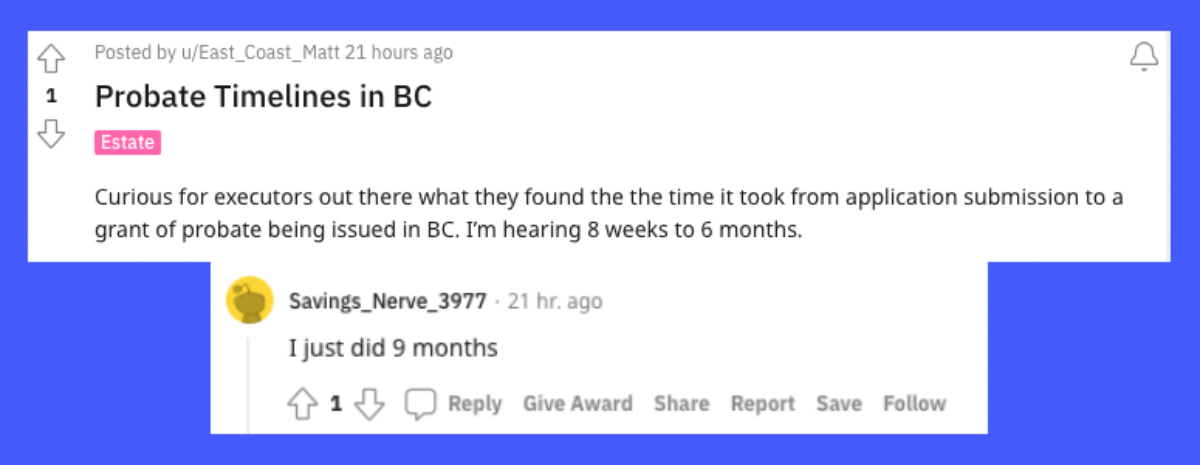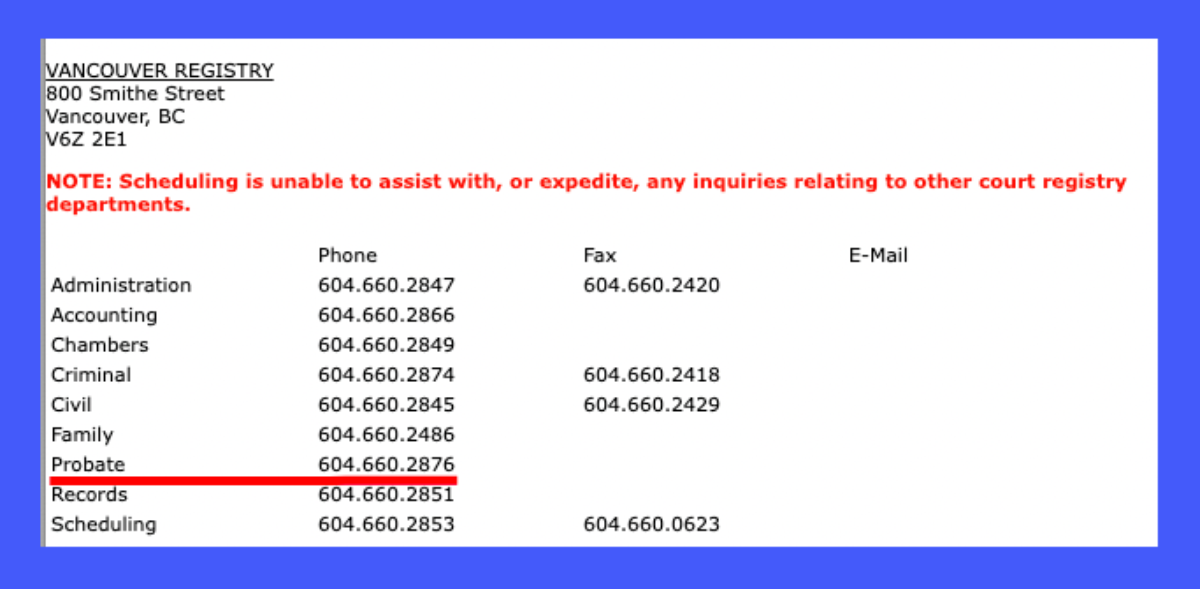Estate Settlement
Dec 04, 2024
How Do Executors Mail Inheritance Checks?
Find out how inheritance checks are mailed, including security measures and what to do if there are delays in receiving them.
Learn how probate in BC can span up to a year, with detailed insights into the timeline and factors that influence the duration.


Taking place in British Columbia’s supreme court, the probate process can take up to 1 year to complete the process.
From our own anecdotal evidence, estates typically finish probate within 8-12 months upon receiving a grant of probate / administration from the supreme court.
The specific length of time will depend on various factors such as the complexity of the estate and the efficiency of the court system.
It is important to ensure that all forms are filled out correctly and that court deadlines are met in order to facilitate a smooth and timely process.
Additionally, factors such as the presence of a will, disputes among beneficiaries, and the need for multiple court hearings can also affect the length of probate.
The probate process in BC begins with the appointment of an executor, who is responsible for managing the deceased person's assets and carrying out the instructions outlined in their will.
Here is a quick overview of the probate process in BC so you can get an understanding of what probate actually is:
Part 1: Applying for a grant of probate: To start probate, the executor is responsible to apply for a grant of probate and pay the probate fee.
To obtain a grant of probate with a will, the executor must file Form P3 – Affidavit of Applicant for Grant of Probate with the court, along with the original will and a death certificate.
The court will review the application and, if approved, will issue a grant of probate.
If the decedent passed away without a will, the administrator must submit form Form P5 – Affidavit of Applicant for Grant of Administration without will annexed.
This executor on r/personalfinancecanada had to wait 9 months before the BC courts issued a grant of probate:

Part 2: Gathering and inventorying assets: Once the grant of probate is obtained, the executor must gather and inventory all of the deceased person's assets, including property, investments, and personal possessions. Once estate assets have been gathered, Form P10 should be filed and submitted.
This step is important to ensure that all assets are accounted for and to prepare for the distribution of assets.
Part 3: Identifying and notifying creditors: The executor must also identify and notify any creditors of the estate, and pay off any outstanding debts. This step is important to ensure that the estate is settled properly and that the beneficiaries receive their fair share of the assets.
Part 4: Distributing assets: The executor must then distribute the assets of the estate according to the will or the laws of intestacy (if the deceased person died without a will). This may include selling property, transferring ownership of assets to beneficiaries, and distributing cash and other assets.
Part 5: Filing a final accounting and obtaining a discharge: Finally, the executor must file a final accounting with the court and obtain a discharge, which releases them from their responsibilities as executor. Once the estate has been settled, the executor must be filled out and submit Form P17 relieving the executor of their duties.
This step is important to ensure that the court is satisfied that the estate has been settled properly and that the executor has fulfilled their duties.
It's worth mentioning that the probate process can be emotionally and financially taxing for the executor, and it may be helpful to seek guidance from a lawyer or other professional to assist in navigating through the process.
The length of probate in BC can vary significantly depending on several factors, including:
The complexity of the estate: Estates with numerous assets, multiple beneficiaries, or disputes over the will can take longer to settle than simpler estates.
The availability of the executor: The executor is responsible for managing the estate, and their availability can affect the speed of the probate process.
The number of creditors: Estates with many creditors will take longer to pay off debts than estates with few creditors.
The court's workload: The court's workload can affect the speed of probate.
Although every Probate case is different, and process times may vary - there are a few things that can be done to ensure that your case is completed as quickly as possible.
Hire a professional: A professional can help the executor navigate the legal process and ensure that everything is done correctly.
Gather all the necessary documents: Make sure the executor has all the necessary documents, such as the will and death certificate, before applying for probate.
Notify creditors: Notify creditors as soon as possible to avoid delays.
File the final accounting promptly: File the final accounting with the court as soon as possible to avoid delays.
As an executor, it's important to stay informed about the progress of your probate case. One way to do this is by calling your local supreme court and asking for an update.
The court staff will be able to provide you with information on the status of your case and any next steps that need to be taken.
To find the contact information for your local supreme court, you can visit this website:
https://www.bccourts.ca/supreme_court/court_locations_and_contacts.aspx#
Then, once on the BC supreme court website, find your local supreme court, click on it and then find the probate court - as seen below

Settling an estate can be a tough and overwhelming process, but you don't have to go through it alone.
ClearEstate has the expertise and experience to make the process as smooth as possible. Our team successfully files 1,000's of probate applications a year and we're ready to help you too.
Don't let probate stress you out any longer, book a free consultation with us now and let's work together to close out the estate in a simple and fast manner.
 Simplify Probate Today
Simplify Probate Today
Get expert guidance from our probate specialists who've helped 10,000+ families.
Book a free consultation today